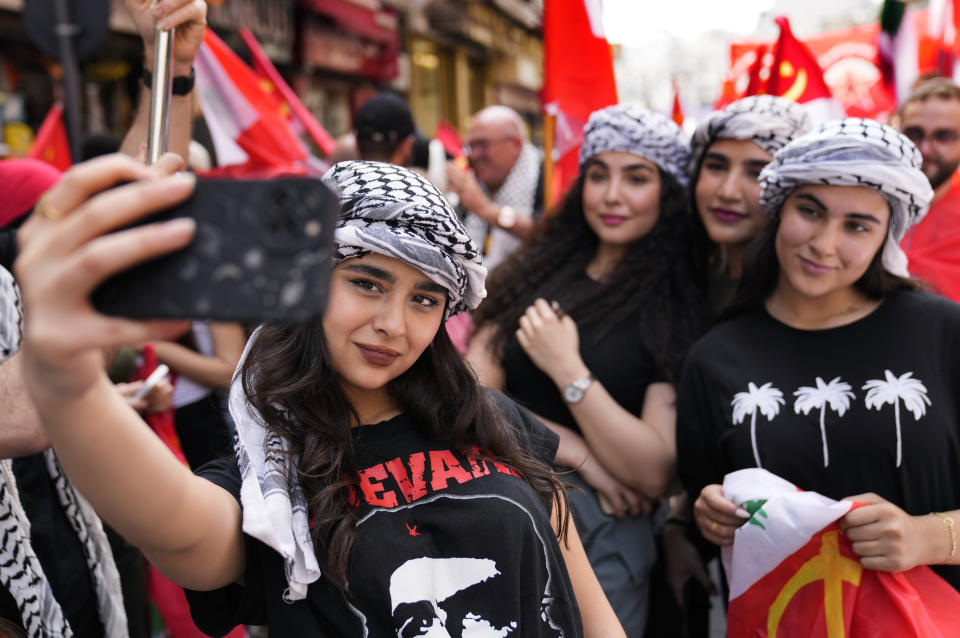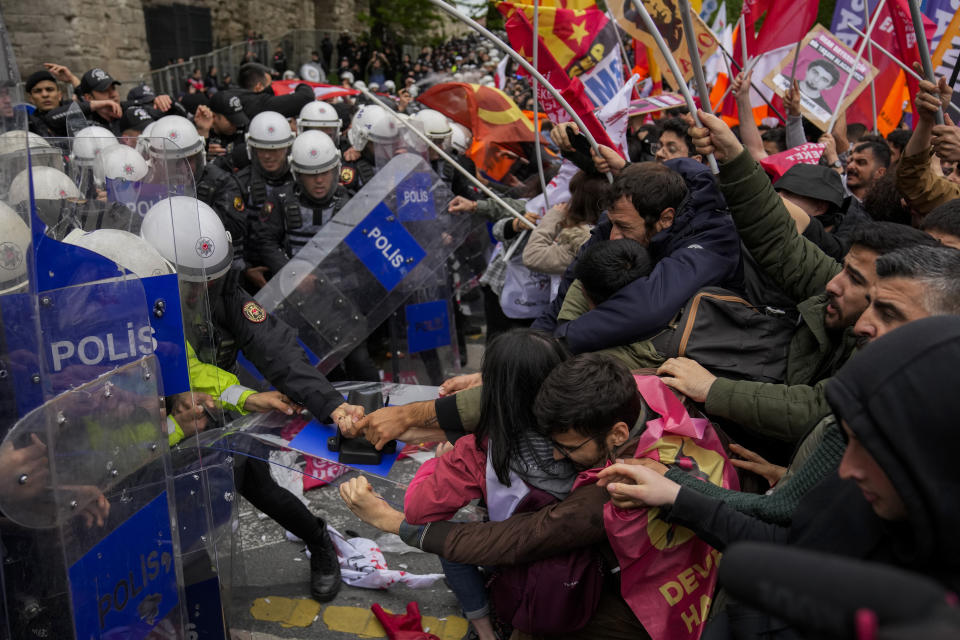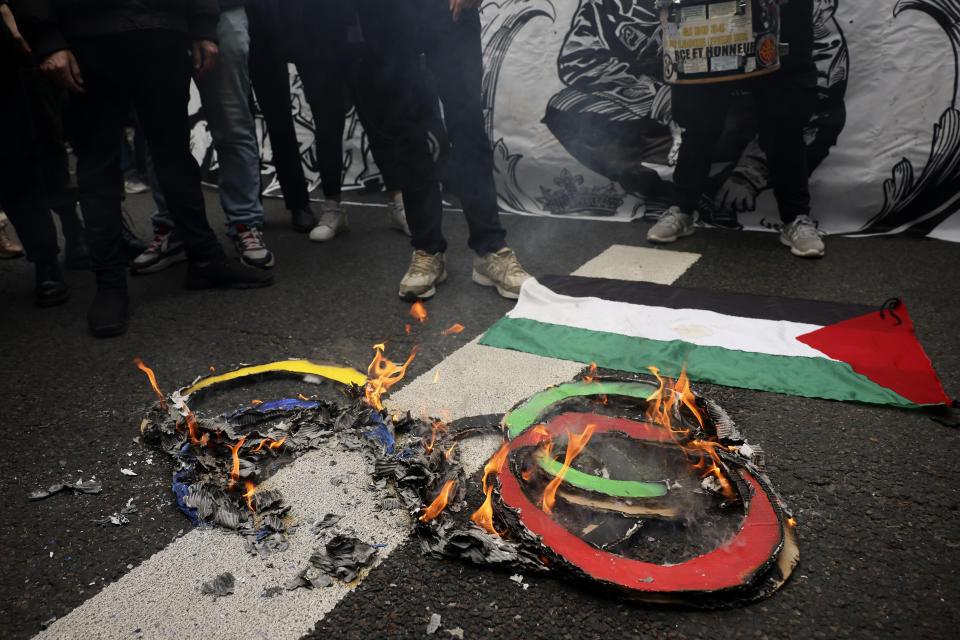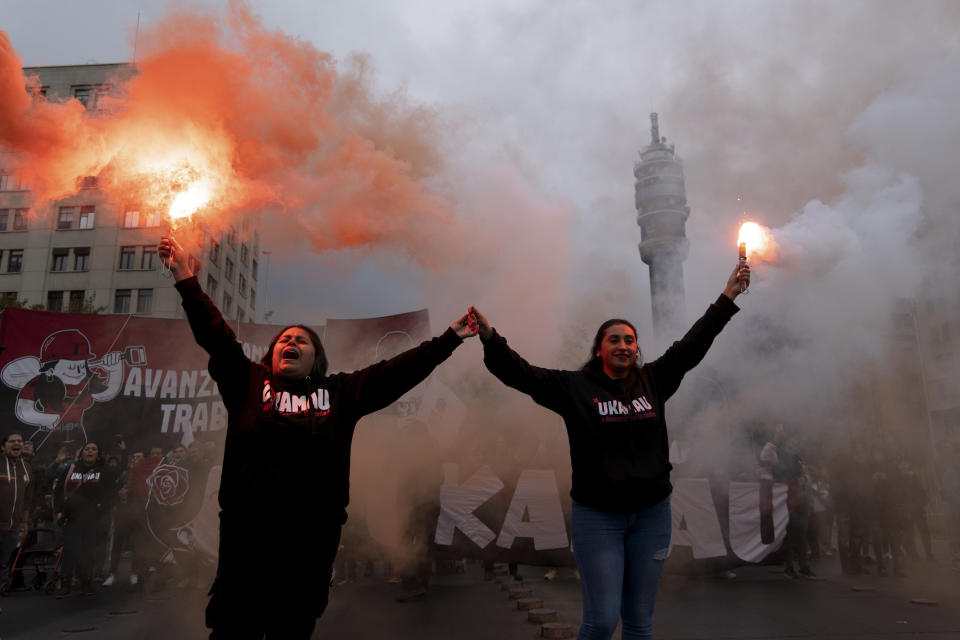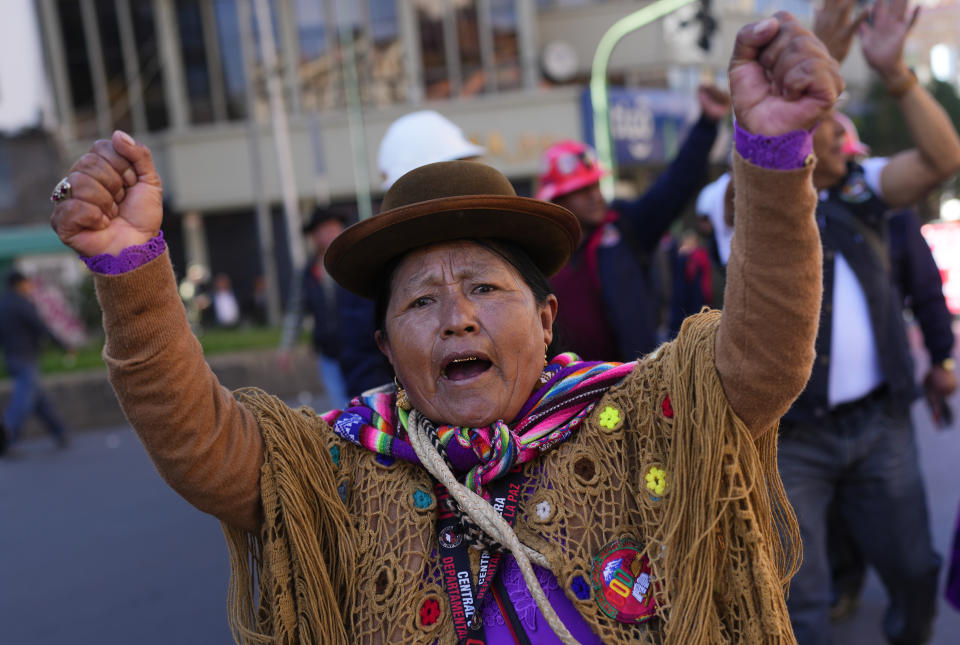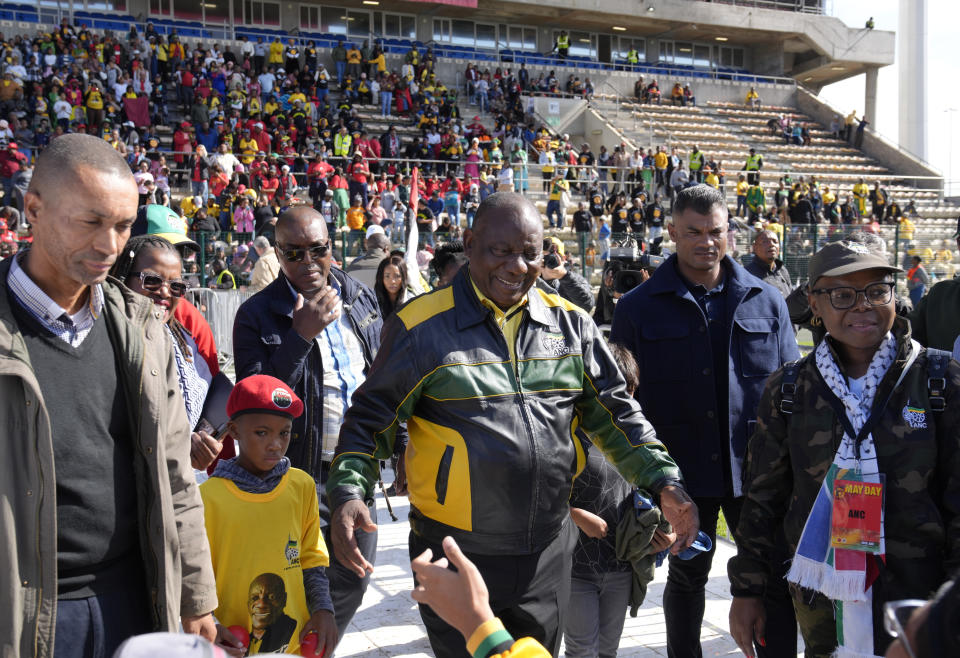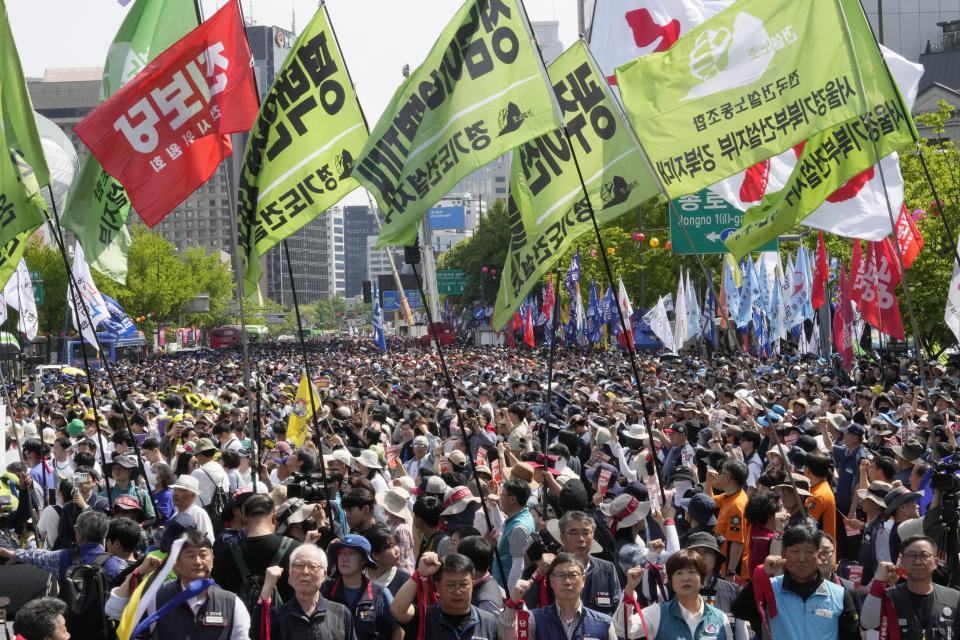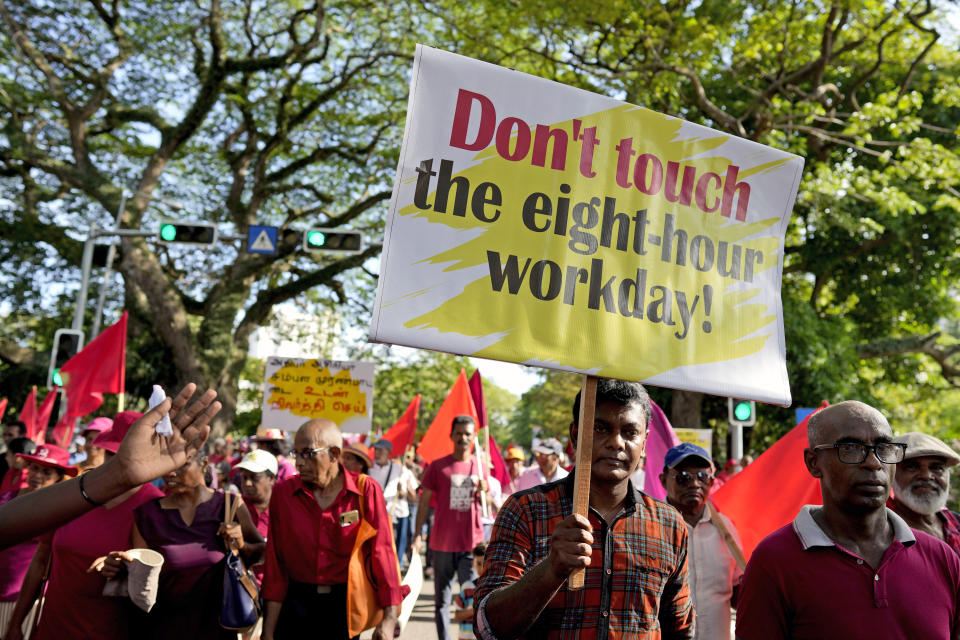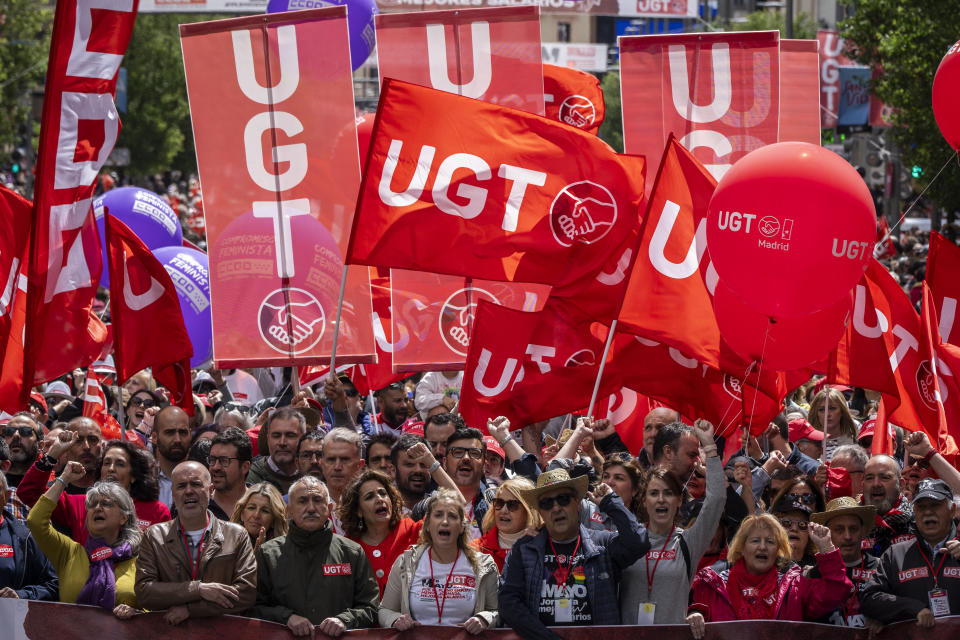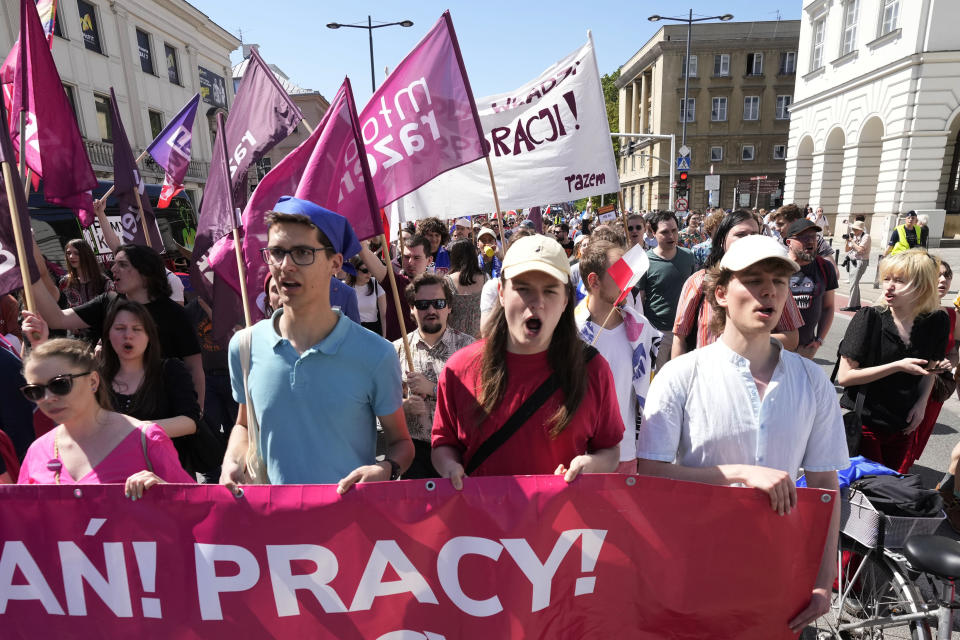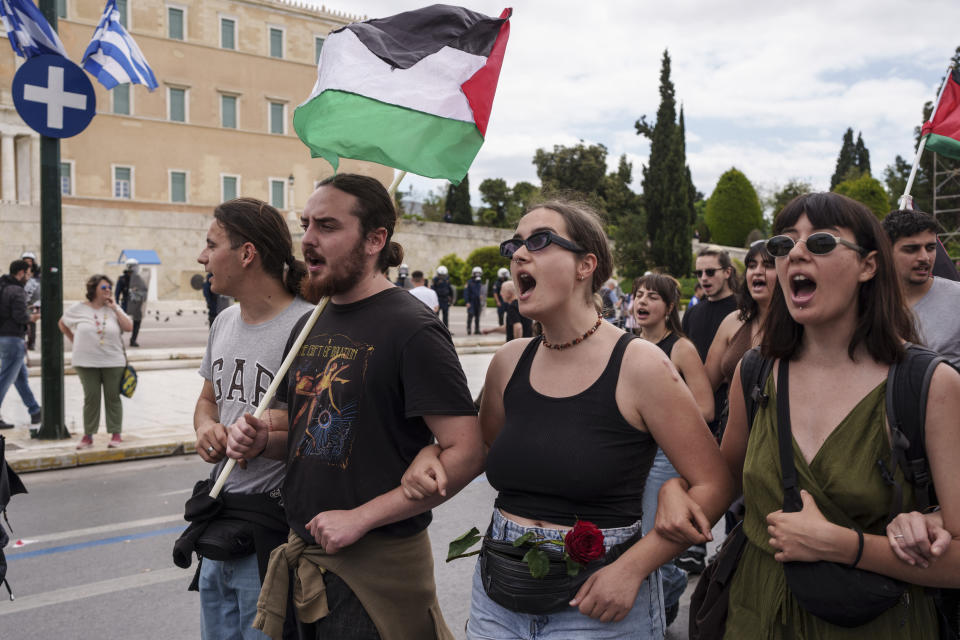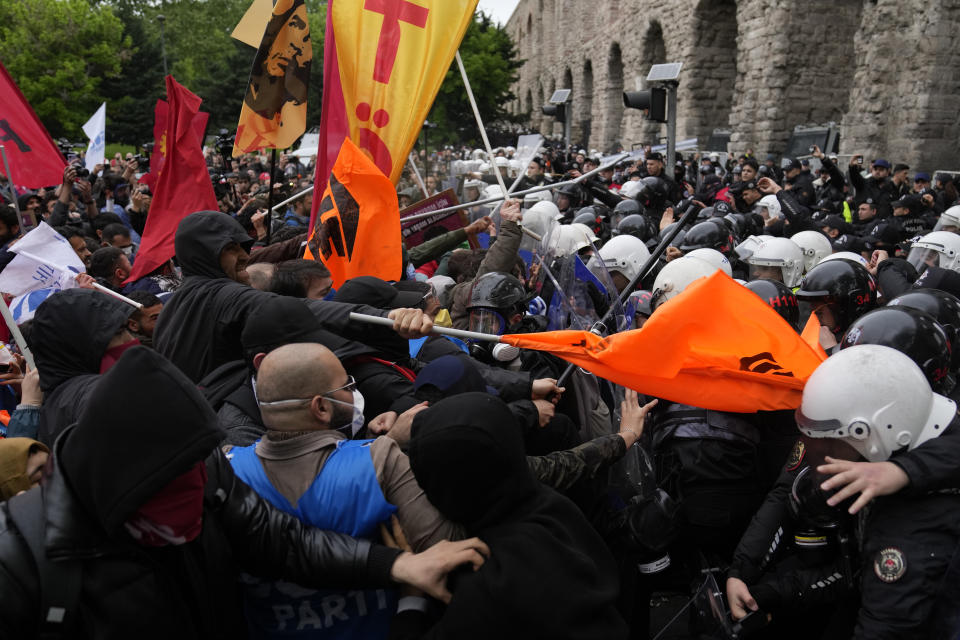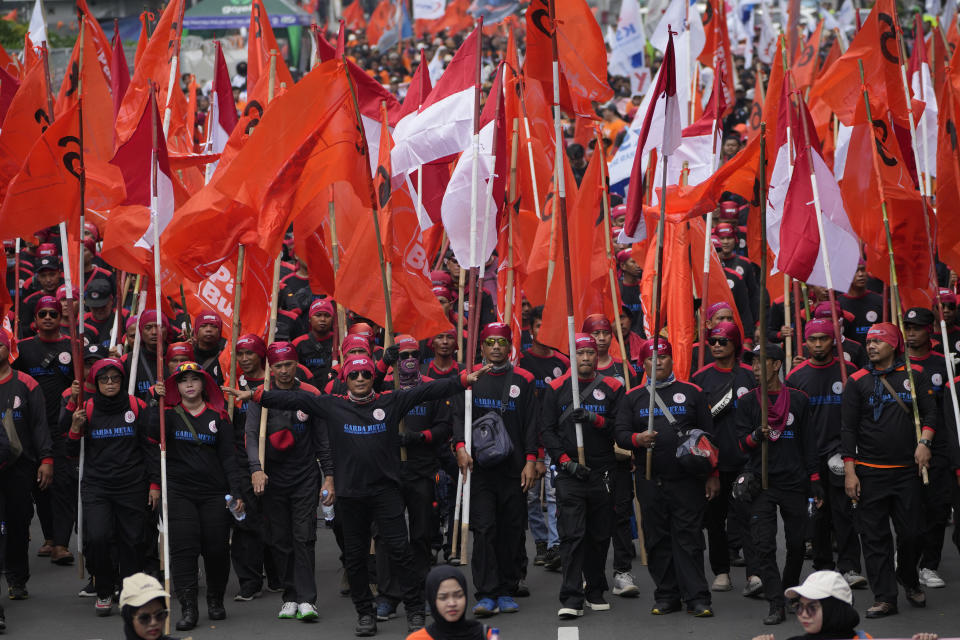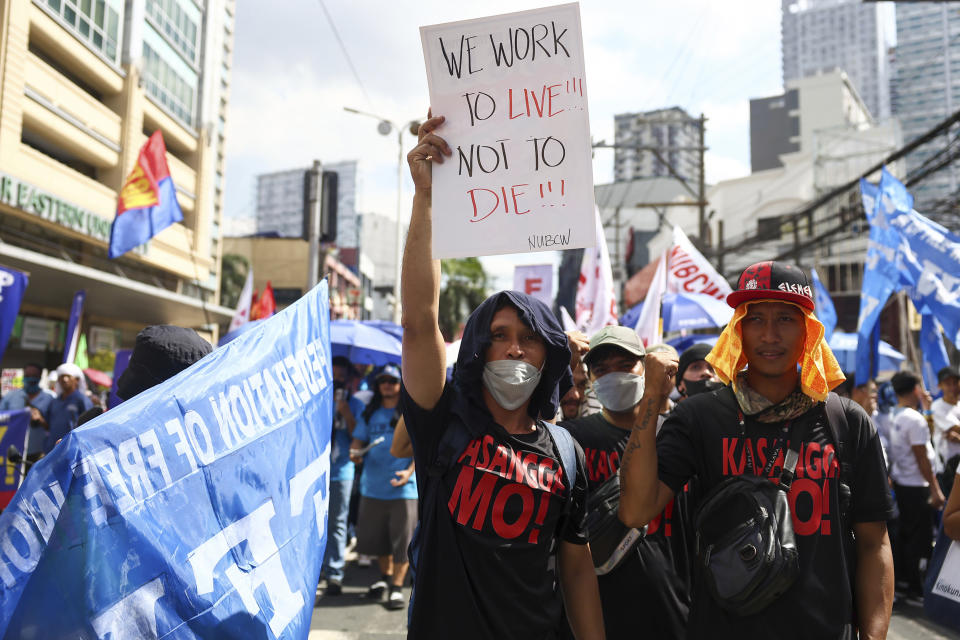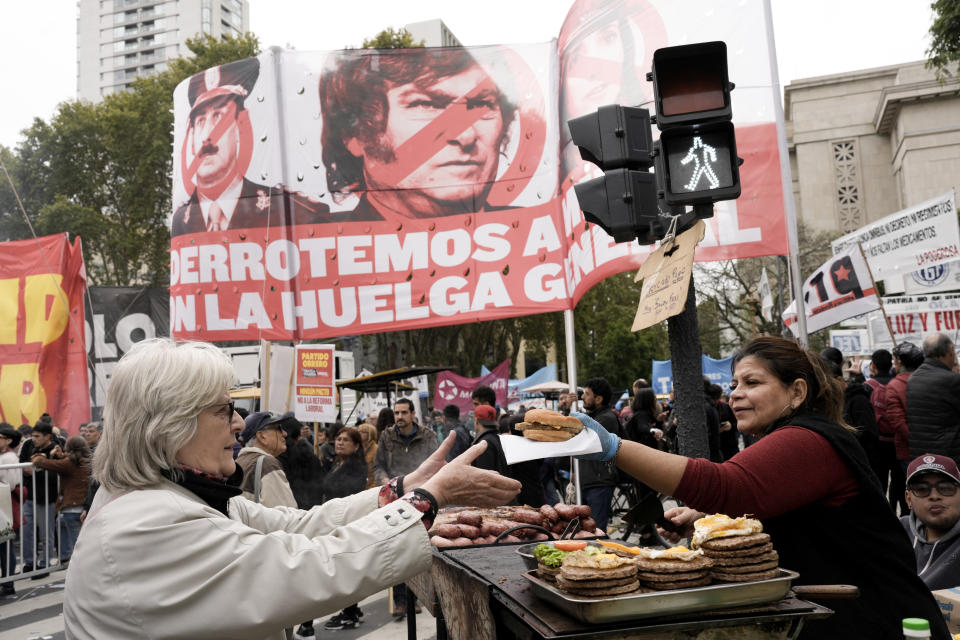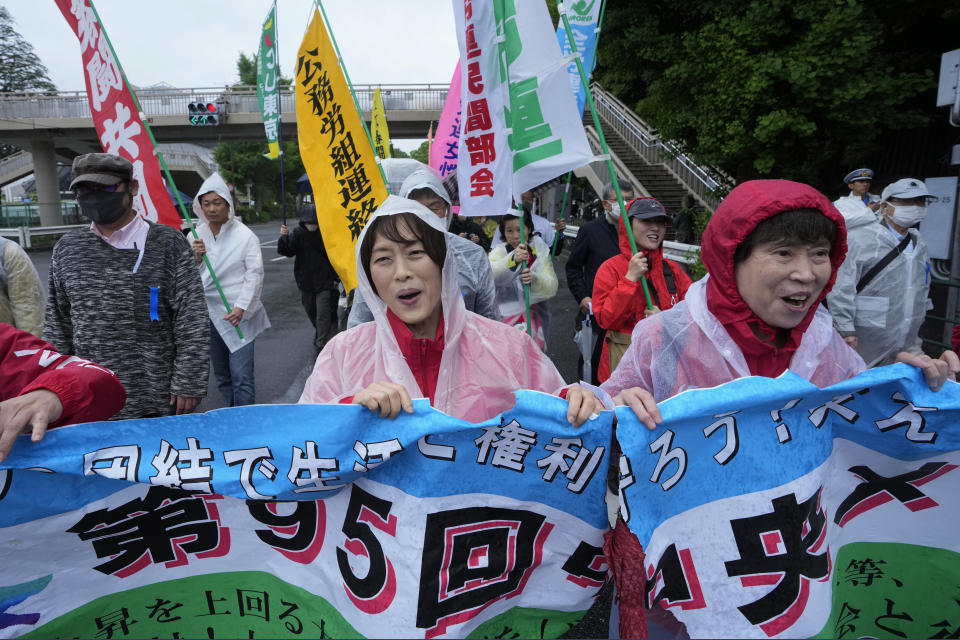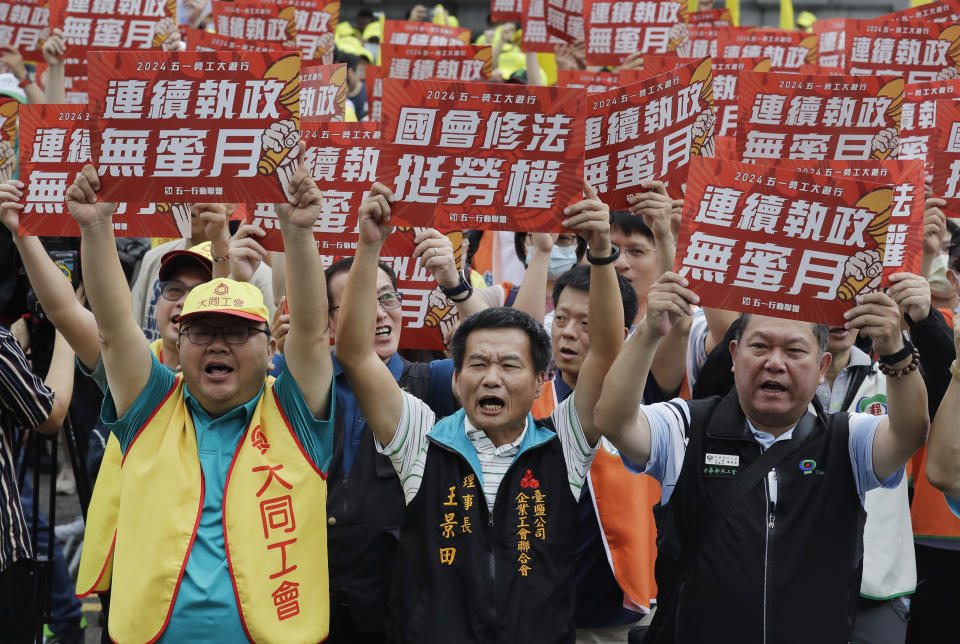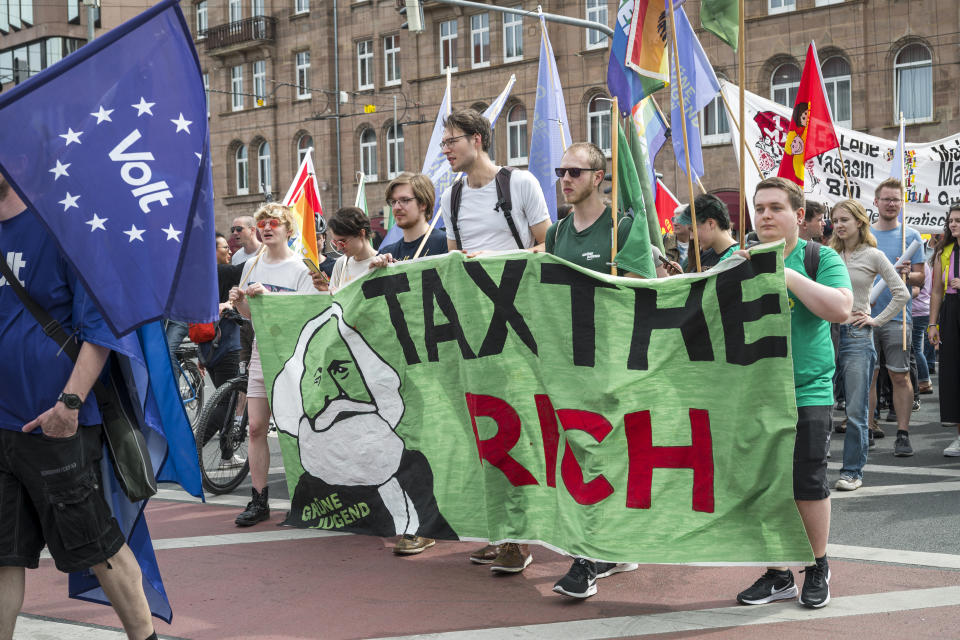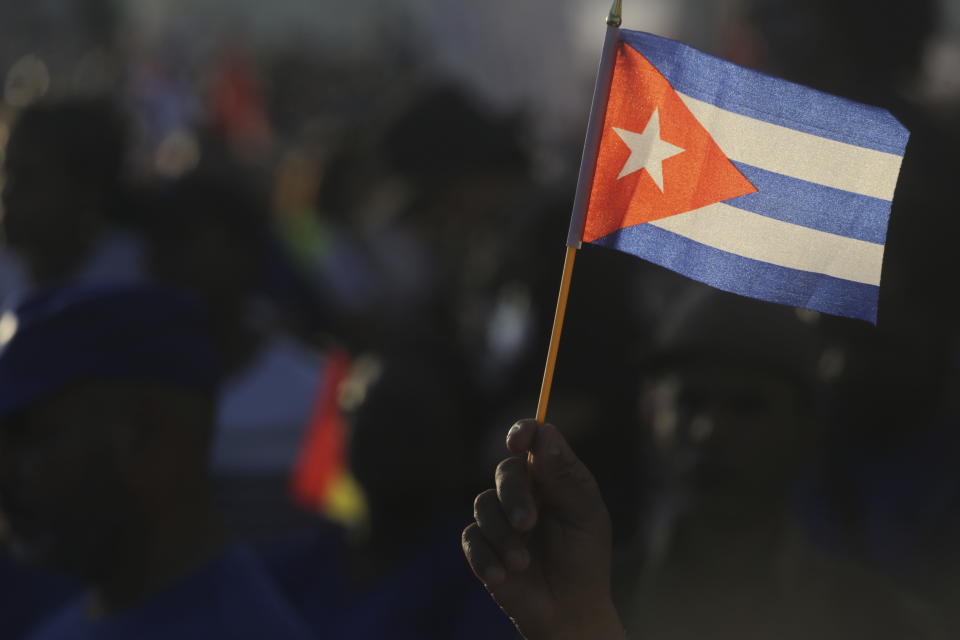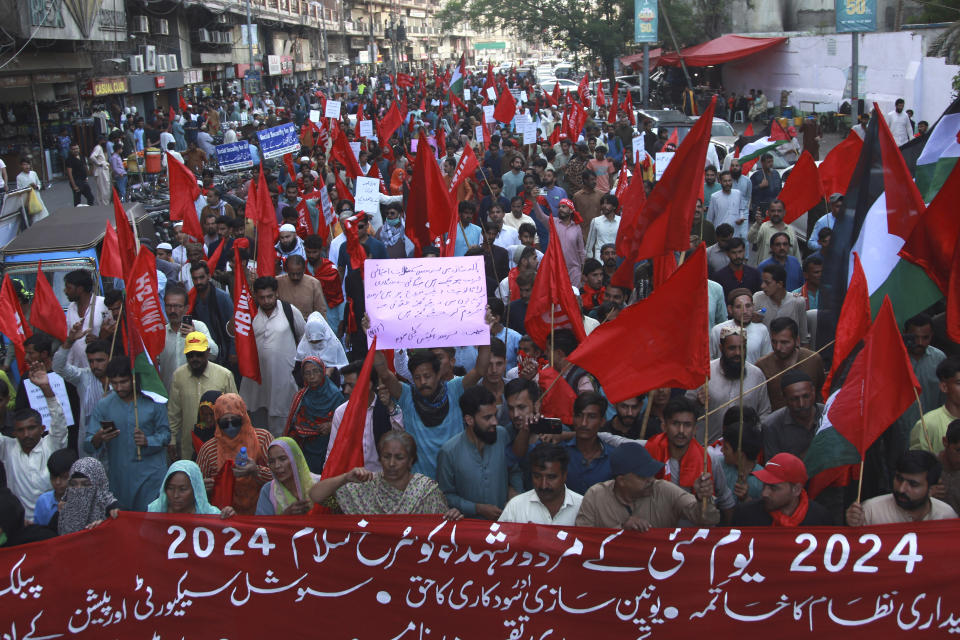Pro-Palestinian banners. Blazing Olympic rings. Workers' May Day rallies confront turbulent times
ISTANBUL (AP) — Workers and activists around the world marked May Day with largely peaceful protests Wednesday over rising prices, low wages and calls for greater labor rights. Pro- Palestinian sentiments were also on display.
Police in Istanbul used tear gas and fired rubber bullets to disperse thousands of people who tried to break through a barricade and reach the main Taksim square in defiance of a ban. Interior Minister Ali Yerlikaya said at least 210 people were detained.
President Recep Tayyip Erdogan’s government has long declared Taksim off-limits for demonstrations on security grounds. In 1977, unidentified gunmen opened fire on a May Day celebration there, causing a stampede and killing 34 people. On Wednesday, a small group of trade union representatives lay a wreath at a monument to victims.
May Day, which falls on May 1, is observed to celebrate workers’ rights. It's also an opportunity to air economic grievances or political demands. “Tax the rich,” one banner in Germany read. “Don't touch the eight-hour workday!” another read in Sri Lanka.
In Paris, police fired tear gas as thousands of protesters marched through the French capital, seeking better pay and working conditions. Police said 12 officers were hospitalized after a homemade explosive was set off on the sidelines of the march and at least 45 people were detained after instances of scattered violence
A group of protesters set makeshift Olympic rings on fire to show discontent with the Summer Games that start in less than three months. France’s unions have warned of a strike during the Games if the government does not adequately compensate people forced to work during summer holidays.
Pro-Palestinian groups joined the Paris rally, chanting slogans in support for people in Gaza. There were similar scenes in other parts of the world. In Greece, pro-Palestinian protesters joined May Day rallies, waving a giant Palestinian flag as they marched past the Greek parliament. Others displayed banners in support of pro-Palestinian protesting students in the United States.
“We want to express our solidarity with students in the United States, who are facing great repression of their rights and their just demands,” said Nikos Mavrokefalos at the march. “We want to send a message that workers say no to exploitation, no to poverty, no to high prices,” he added.
Several thousand protesters joined the Athens marches as labor strikes disrupted public transport across Greece. The largest union demands a return to collective bargaining after labor rights were scrapped during the 2010-18 financial crisis.
In the German capital, around 11,600 people marched through the immigrant neighborhoods of Kreuzberg and Neukoelln, waving Palestinian flags and holding banners that read “No weapons for Israel” or “Free Palestine,” German news agency dpa reported.
Throughout Latin America, workers marched to protest austerity measures and demand higher wages. In Argentina, unions galvanized crowds to vent their rage over libertarian President Javier Milei’s economic policies, which they say benefit the wealthy while inflicting pain on the poor and middle class.
“Paying rent is difficult, buying rice is difficult, everything under this guy (Milei) is difficult,” said 40-year-old garbage collector Leandro Rosas, trailing protesters down the street with a broom because this May Day, he said he couldn’t even surrender a shift’s pay.
Meanwhile, Bolivian President Luis Arce joined the workers’ march and decreed a 5.8% increase in the national minimum wage, a bid to mobilize support as a worsening economic crisis raises the specter of social unrest. The thousands-strong protests in Santiago, Chile, turned violent in some areas as security forces unleashed water cannons and tear gas on corwds, drenching and dispersing protesters who vandalized shops and government buildings.
In Brazil, President Luiz Inácio Lula da Silva ratified a law that extends income tax exemptions to those earning up to two minimum wages per month, or about $544.
“In our country there will be no tax breaks to favor the richest, but to favor those who work and live off their wages,” Lula told a crowd sweltering in the sun at a soccer stadium in São Paulo.
In Nigeria, where inflation is the highest in 28 years, at over 33%, unions demanded bigger salary increases. In South Africa, pro-Palestinian demonstrators joined May Day events and in Kenya, President William Ruto called for an increase in the country's minimum wage.
In Lebanon, pro-Palestinian marchers mingled with workers demanding an end to a miserable economic crisis. “Politicians do not feel the pain of the worker or the economic conditions,” said one demonstrator, Abed Tabbaa. In Iraq, protesters demanded better wages, the reopening of closed factories and the end to privatization of certain businesses.
Tens of thousands Sri Lankans paraded through the capital as the country struggles through its worst economic crisis, two years after declaring bankruptcy. Discontent has grown over efforts to increase revenue by raising the price of electricity and imposing taxes on professionals and small businesses.
In South Korea's capital, thousands of protesters shouted pro-labor slogans at a rally that organizers said was meant to step up criticism of what they call anti-labor policies pursued by President Yoon Suk Yeol's conservative government.
“In the past two years under the Yoon Suk Yeol government, the lives of our laborers have plunged into despair,” Yang Kyung-soo, leader of the Korean Confederation of Trade Unions, said in a speech. Union members criticized Yoon’s recent veto of a bill aimed at limiting companies’ rights to seek compensation for damages caused by union strikes.
In Japan, more than 10,000 people gathered in Tokyo, demanding salary increases to set off price increases.
Indonesian workers demanded protections for migrant workers abroad and a minimum wage raise. They gathered amid a tight police presence, chanting slogans against the new Job Creation Law and loosened outsourcing rules.
In the Philippines, hundreds of workers and left-wing activists marched to demand wage increases and job security amid soaring food and oil prices. Riot police stopped them from getting close to the presidential palace.
___
Turnbull reported from Paris and Kim from Seoul. Associated Press journalists around the world contributed.

 Yahoo News
Yahoo News 